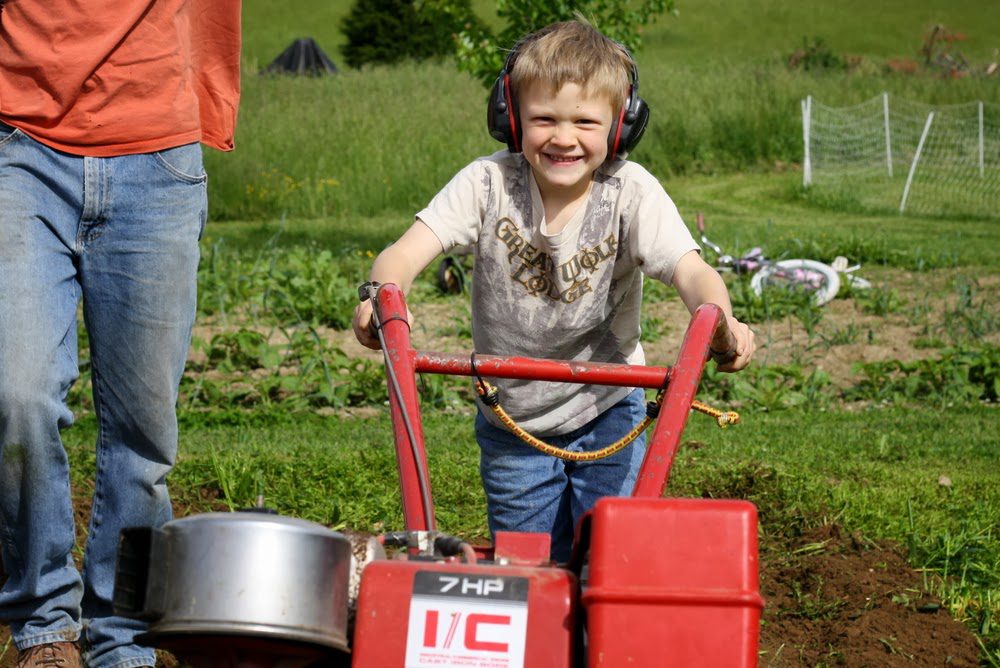This latest Sunday school class, the one where we had a panel of homeschool parents, was both wonderful and frustrating.
It was wonderful because the panel participants reflected a wide range of homeschool practices and approaches and were concise and deeply personal in the sharing of them. It was also wonderful because the room was filled with people who listened hard and asked thoughtful questions. The frustrating part was that the post-panel conversation never got to the heart of education: learning.
This is curious. Because if, in a conversation specifically dedicated to education, a group of people (academics, no less!) can completely sidestep the central reason for an educational system—teaching knowledge to our children—maybe learning isn’t what education is all about? Wouldn’t that be something.
Back when I met with the Sunday school class leaders—two friends who are advocates of the public school system—I found myself struggling to explain why lumping homeschooling in with public and private schooling felt wrong. It was like a question on an achievement test: circle the one item in the group that doesn’t belong. In this case, the answer, of course, would be homeschooling.
See, when discussing public and private schooling, the conversation takes place within a framework of Institution. But homeschooling is outside of that framework. Homeschooling takes the concept of education and strips away all the trappings. As a result, the conversation immediately becomes extremely basic: what is learning and how do we go about doing it?
Except that we can’t get to that conversation!
In the class response time, I sensed a deep opposition to and anxiety about homeschooling from a few of the people. I’m beginning to wonder if these strong emotions might be a result of our Anabaptist/Mennonite history.
See, a few generations back, the Mennonite church separated itself from the world by dress (for those of you who aren’t familiar with Mennonites, think Amish but not quite). After a couple generations, the church stopped with the head coverings and cape dresses and became “worldly” again, but then the church struggled with how to be relevant to the world. For some Mennonites (as well as for many other Christians regardless of denomination) (so maybe this is a Christian issue?), transforming the country’s institutions, such as the public school system, through hands-on involvement became tremendously important. As a result, when church members pull their children out of the school system to educate at home, to these social justice minded Mennonites it feels like the church is, once again, in danger of becoming irrelevant.
Of course, I don’t know this for a fact. I’m just wondering.
Funny thing is, none of the parents on the panel decided to homeschool out of opposition to the school system. They just wanted to teach their children at home.
People who opt out of the school system are no more shunning society than people who plant vegetable gardens. Sure, some people are delightfully radical about their vegetables; they grow food so they can be self-reliant, or because they feel it is their moral and ethical responsibility. But more often then not, people (even the ones who are radical about it) grow vegetables because they find joy in coaxing food from dirt.
Newsflash: plucking onions from the soil with your own two dirty hands instead of purchasing them in a plastic mesh bag under florescent lighting doesn’t make a person irrelevant to society. It makes a person a gardener.

Isn’t it the freedom to discover what brings us joy at the heart of a healthy society? Aren’t our very differences—our lifestyle choices, religious practices, and values—what makes us interesting?
Homeschooling is simply a different way of educating our children. It’s a personal choice, and that, in itself, is enough to make it a relevant one.



11 Comments
Anonymous
I am the product of a public school education, as is my child. None of my contemporaries homeschooled their children, so my knowledge in this area is nonexistent. However, one or two of my daughter's generation (friends) homeschool their children. Perhaps the discussion never gets to "learning" because those who don't homeschool don't understand how it "works". Is it that they think all the teaching comes solely from the parent? Are they concerned about "social" development; I've heard that criticism a number of times? Do they know that there is a support system of people and resources that aid in homeschooling alternatives? I don't know the answers, but perhaps, they don't either. Angela Muller
Jennifer Jo
This confuses me, too. Why is it that some people (non-homeschoolers) seem to "get" the concept while other people, no matter how many times the nitty-gritty is explained, still don't understand? It's fascinating.
Lauralli
I'm not going to discuss "home education" here and now. I've been at this for 15 years and I have no answers for anyone. I'm just glad we have choices to do what we feel is best for our children! But, I do want to discuss the Mennonites……..just very curious………you say the church abandoned the dress code. But, around my neck of the woods, the Mennonites still dress "almost Amish" 🙂 I can spot them a mile away. (Usually at the fabric store!) I understand that I live in Arkansas and we tend to be "a few generations" behind anyway, but what gives? I always assumed all Mennonites were like the ones I see here. That is, until I started reading your blog. Please explain to enlighten (educate) us!
Jennifer Jo
Hi Lauralli!
Your confusion makes perfect sense—there are countless different groups of Mennonites.
Back in the 70s, a large chunk of Mennonites gave up the dress code, though I don't know numbers or percentages. However, there are still a lot of plain-dressing Mennonites—they're just not the only kind anymore. There are the Mennonites you see in your area and the ones like me and a whole bunch of varieties in between. For being a peace church, we certainly are a fractious group of people!
If you want to know more about Mennonites, Third Way Cafe is a helpful website: http://bit.ly/1dt8K4x
Lauralli
Thanks for the lesson! We teach and learn everyday, don't we? I'm really not very culturally aware outside my little (tiny speck) corner of the world! Your church in its beliefs are not so very different from my own. But, I would have never known that if it weren't for your blog! I've never known any Mennonites, but at least now I know ABOUT Mennonites! Blessings to you and yours!
Margo
Great points. I am teaching my children at home, too, but I have less time to do it because they attend public school 5 days a week.
Also, one of the reasons our children are in public school is because we want them to learn in a less-than-perfect environment because this has been our experience in adult life. And I want them to learn to handle it. I know I could streamline and tailor an education for each of my children at home that would allow them to acquire book learning at tremendous rates. . . but wisdom? Life experience? Maybe. . . And who knows, maybe in hindsight, I will see how the worldly empire has sucked them in and instilled alien morals and my husband and I did not realize our goals in the education of our children.
Jennifer Jo
I wouldn't say our home is a perfect environment! And don't you experience wisdom and life experience in your family's day-to-day existence? (You are certainly right about teaching your children at home—you do it all the time. I love your cooking lesson posts.)
Patrick
Excellent points. I especially think you've touched on something central: Why a panel discussion on homeschooling, next to a public or private one, doesn't really work. The concept that both private and public schooling systems are institutions is central. The reasons for homeschooling are extremely diverse and some folks do use homeschooling as another, alternative institution. However, many others (like me) entirely reject the notion that an institution is necessary for education to occur. That's why I also don't like the term "homeschool". It implies another schooling system that occurs at home. I don't intend to teach my kids to school at all. Schooling implies teaching kids to move uniformly together as a group, not a great breeding ground for future counter-culturals. As I tell my kids, schools are for fish.
The fundamental issue is whether you believe education or learning needs to occur in an institution. I do not. In fact, I think institutions are frequently antithetical to real learning. I guess I'm just sufficiently post-postmodern that I no longer see the need to equivocate, apologize, and hedge so as not offend those who decide to school their children. It is a potentially divisive topic, because like pacifism/war, sexual orientation, abortion, etc. it has deep, deep moral undertones. A decision to send a child to 12 + years of daily confinement away from their family in the interest of schooling them to the mores of the larger culture is not simply a preference, like choosing strawberry or chocolate ice cream. It is a deeply moral decision and one that I find as disturbing as I would were a fellow church member to enlist their child in the military.
We spend years giving our children the message that we don't really want them at home. Eventually, they figure this out.
Jennifer Jo
I chose to call this series "home education" because I wanted to get away from the term "homeschool" (at least in the title). But after reading your comments, I think it would've been more clear to simply call it an "education" series.
Love your comments. They are making me think.
Rebecca
I swan! (puts head in hands) I'm afraid that the panicked search for relevance is going to be the death of Anabaptism. I'm a generations-deep Brethren who joined the Mennonites as an adult. A significant reason for the switch was my sense that the Mennonites were doing a better job at preserving their weirdness and irrelevance. In my opinion, we best follow Jesus/serve our neighbor/change the world from outside the status quo. In so far as schooling is considered inevitable, immutable, irrefutable, I am opposed to it. I understand not wanting the grouchy ol' bishop micro-managing your hem line. But at least in my world he's no longer in charge and I don't propose putting my head, or my children's heads, under the yoke of another's making.
Tricia @ The Domestic Fringe
Well said. I love that we have choices. I only wish there was more mutual respect (in real day-to-day life) for people who educated their children differently. I've met plenty of anti-homeschoolers, but I've also met many homeschooling parents who are rabidly against public schools and the parent's choice to use the public schools. Sometimes the constant waring between the two sides drives me nuts. And, I'm only speaking from my very limited personal experience. Oddly enough, when I pulled my kids out of school to homeschool them for a year, my choice was very well accepted and I don't live in a very religious community, so I don't think that had much influence on people's opinions. I think parents know their children best and I try to respect other people's individual choices for education, and mostly, I'm just glad we have choices. Anyway, it's awesome that you've opened up conversation about this topic.
~FringeGirl